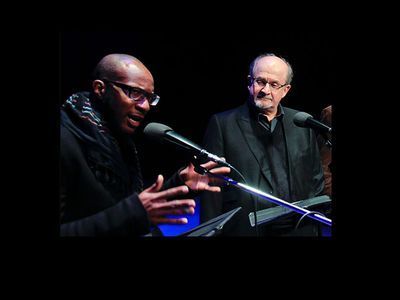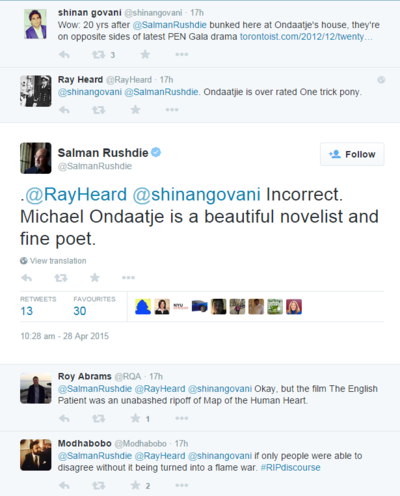PEN pals
Teju Cole and Salman Rushdie discuss their work at Symphony Space’s Selected Shorts, hosted by the Time Out New York, December 2014. Photograph: Rahav Segev/Symphony Space
By MICHAEL CAINES
In a few days’ time, PEN American Center will hold its annual gala dinner in New York, and will give the PEN/Toni and James C. Goodale Freedom of Expression Courage Award to Charlie Hebdo, the Parisian “journal irresponsible” – for the obvious, awful reason.
The past few days have ensured, however, that diners’ attention will be divided between the presence of two of the magazine’s surviving representatives – Gérard Biard and Jean-Baptiste Thoret, who are due to collect the award – and six notable absentees. . . .
As reported in the New York Times this weekend, the writers Peter Carey, Teju Cole, Rachel Kushner, Michael Ondaatje, Francine Prose and Taiye Selasi have withdrawn as “table hosts” for the event, rousing the ire of those who like to howl about free speech in the usual forums. Adam Boulton, a television presenter, rose to the occasion to put out this, the ultimate barb against Carey:
What Salman Rushdie had originally said was this: “The award will be given. PEN is holding firm. Just 6 pussies. Six Authors in Search of a bit of Character”.
More helpfully, the writers themselves and PEN's official representatives have stated their views. See the response from the director of English PEN, Jo Glanville, the statements by Kushner and Carey in the NYT, George Monbiot’s dialogue-in-tweets with Rushdie (“2 sound values – pro-free speech, anti-hate speech – can conflict”). And Cole – who is described on his website, by the author of The Satanic Verses, as one of the “most gifted writers of his generation” – has told The Intercept:
“I’m a free-speech fundamentalist, but I don’t think it’s a good use of our headspace or moral commitments to lionize Charlie Hebdo in particular. L’affaire Rushdie (for example) was a very different matter, as different as blasphemy is from racism. I support Rushdie 100%, but I don’t want to sit in a room and cheer Charlie Hebdo. This distinction seems to have been difficult for people to understand, and any dissent from the consensus about Charlie Hebdo is read as somehow 'supporting the terrorists,' or somehow believing that they deserved to be murdered.
"I would rather honor Raif Badawi, Avijit Roy, Edward Snowden, or Chelsea Manning, who have also paid steeply for their courage, but whose ideals are much more progressive than Charlie’s. I would like an acknowledgement of the Kenyan students who were murdered for no greater crime than being college students. And, if we are talking about free speech, I would rather PEN shed more light on the awful effects of governmental spying in the US, and the general issue of surveillance.”
In fact, PEN is not ignoring those other issues – far from it, as demonstrated by, for instance, the English branch’s campaign for reform of British surveillance laws, and its petition in response to the seemingly dire state of things in Mexico. It’s chosen, on this occasion, to emphasize the “courage” of those whose views may be “shocking, disturbing or offensive” over “progressive” ideals – but alongside the courage of others. Suzanne Nossel, the executive director of PEN American Center, has pointed out that the imprisoned Azerbaijani journalist Khadija Ismayilova is also to be honoured this year.
What kind of speech we’re defending ought not to matter in such debates; but this latest spat suggests that it’s impossible to avoid getting into arguments about exactly that. Charlie Hebdo is now globally notorious for one aspect of its satirical work, which its detractors deem to be hate speech – for better and for worse, however, hate speech is as much a form of expression as, say, keeping a diary, and many people believe we have a “right” to do one as well as the other. (That’s a noble notion; but is it one for which human history has shown much respect?)
So here’s an insoluble and perhaps inevitable problem when it comes to defending free speech: it can mean defending not only the imprisoned Syrian journalist Mazen Darwish but expressions of “cultural intolerance”, Kushner’s phrase for what Charlie Hebdo does. And it’s unfortunate that disagreements about a point of principle can collapse so easily into something else, as in Boulton’s blurted-out swipe at Carey. When faced with a remark of a similar nature on Twitter, Rushdie was obliged to defend Ondaatje as a writer, his point being at risk of disappearing in the frenzy of tweeted vituperation:
In the future, I wonder, will those six writers be seen as brave for stating their views? Or will history side with their furious detractors? And lost in the middle, how many are there whose quandary is more like that of Michael Greenberg, who reported in the TLS on attending PEN American Center’s Festival of International Literature in 2006, and found himself caught between irreconcilable view on the small matter of a literary event co-sponsored by the Israeli government. The Lebanese writer Elias Khoury made an announcement that was "greeted", Greenberg recalls, "with thunderous applause, spiced with whistles and hoots of approval":
"A strange paralysis comes over me. If I refrain from applauding, I imagine, I’ll appear to be on the side of those who support Israel no matter what. If I do applaud, who knows what vindictive forces I’ll be joining. Maybe the cheers are no more than a naive wish by the audience to feel that literature and the cause of the dispossessed are the same. Yet why so much glee for what, at the very least, is a setback for a festival that seeks to promote international fellowship?”
Peter Stothard's Blog
- Peter Stothard's profile
- 30 followers






